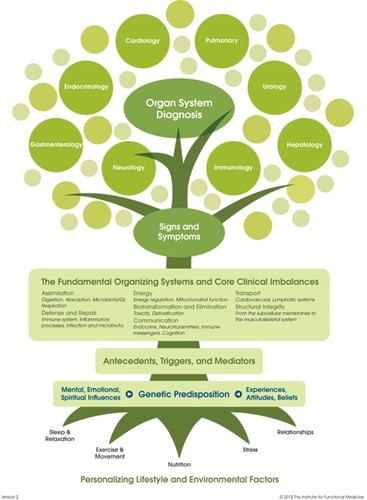Principles of Functional Medicine
Seven basic principles characterise the functional medicine:
- Acknowledging the biological individuality of each human being, based on the concepts of genetic and environmental uniqueness;
- Addressing the web-like interconnections of internal physiologic factors;
- Promoting organ reserve as a means of enhancing the health span, not just the lifespan, of each patient; and
- Incorporating a patient centred rather than a disease centred approach to treatment;
- Seeking a dynamic balance among the internal and external factors in the patient body, mind and spirit;
- Identifying health as a positive vitality not merely the absence of disease and emphasising those factors encourage a vigorous physiology;
- Staying abreast of emerging research – a science based approach;
One way to illustrate where functional medicine falls in the continuum of health and healthcare is to examine the functional “medicine tree” shown below. In its approach to complex chronic disease functional medicine encompasses the whole domain represented by the graphic shown below, the first addresses the patient’s core clinical imbalances, the fundamental lifestyle factors that contribute to chronic disease and the antecedents triggers mediators that initiate and maintain the disease state. Prognosis of course, is part of the functional medicine model but the emphasis is on understanding and improving the functional core of the human being as the starting point for intervention.
Put simply, the functional medicine practitioner will ensure that all routes to wellness are addressed with the patient. This will normally involve strengthening the immune system, decreasing toxicity, normalising inflammatory function, optimising metabolic function, balancing regulatory systems, enhancing regeneration, helping people to live in harmony with their life force and nature.
What is a functional medicine practitioner/doctor?
Functional medicine practitioners focus on restoring balance to the dysfunctional systems by strengthening the fundamental physiologic processes that underlie them and by adjusting environmental and lifestyle inputs to nurture or impair them. This approach leads to therapies that focus on restoring health and function rather than simply controlling signs and symptoms.
Our success as a Functional Medicine Practitioner
Functional medicine at Mi Healthcare of Nutrition has helped many patients and with the breadth of experience of the team, there is little we have not seen or helped people with. We specialise in Lyme disease, autoimmune disease, gut health, hormone health and unexplained illness. There are too many success stories to mention but some of these can be seen on our Google reviews and testimonials.
How a Functional Medicine Practitioner gets better results
Before finding functional medicine I was already practising integrated naturopathic medicine in London, so learning functional medicine just added a bit of a gloss to my practice. What I would say though is that using the functional medicine model it has helped me understand that to get better results with my patients, I need to heal myself on all levels and develop love for all humanity and by doing so can inspire others and provide hope.
How we can help as your Functional Medicine Practitioner
We can help you with your health by acknowledging our greatest health threats now arise from how we live, work, eat, play, and movement.
- Receiving your complete story during the initial consultation;
- Identifying and addressing the challenges of your modifiable lifestyle factors and environmental exposures;
- Organising your clinical imbalances by underlying causes of disease in a systems biology structure, and
- Creating an effective therapeutic partnership between practitioner and patient;
Ultimately the best we can help you as your London functional medicine practitioner is by educating you about healthy lifestyle practices and being an information resource to you that is not driven by propaganda, bias or vested interests.

